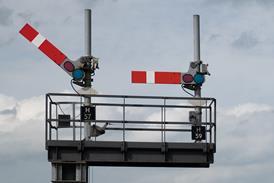INTRO: Four months after taking over as President of Bombardier Inc, Paul Tellier outlines his objectives to Chris Jackson
’OUR AIM is to be the low-cost, high-quality producer, and we will move in that direction over the next few years. Even if we don’t grow our revenues, I am determined to grow our profits.’ That is the blunt objective outlined by Paul Tellier as he reviews his first four months as President & CEO of Bombardier Inc. Having spent 10 years transforming Canadian National into the most profitable railway in North America, he faces a similar challenge with one of the rail industry’s largest suppliers.
’Bombardier has grown very quickly over the past five years - perhaps too quickly’, he admits. ’Now the time has come to put the emphasis on building on what we have acquired - the people, the technology, the assets. We have to focus on profit growth rather than revenue growth, seeking returns at the margin for the benefit of our shareholders.’
With Bombardier’s share price plummeting 70%, Tellier had to move fast. In April he launched a ’quite successful’ financial restructuring. A C$800m share issue (RG 5.03 p324) was oversubscribed and raised C$1·2bn. Further cash will come from spinning off non-core business units; Tellier says the sale of the Recreational Products division should be completed within the next few months.
Bombardier is now focusing on its two core businesses, Aerospace and Transportation. Bombardier’s 2002 results included a write-down from a change of accounting practices at Aerospace, but Tellier says the result will be a stronger balance sheet. He is not unduly worried about the impact of the SARS virus on the international airlines, noting that the company’s products are primarily targeted at the short-haul market.
Tough times in Transport
Tellier is ’not yet satisfied’ with the margins in the two main businesses, and says it will be necessary to ’take steps to raise profits.’ Asked whether this will mean job cuts, he accepts that this is ’not impossible’, although it is ’premature’ to say how much rationalisation will be needed. ’Don’t expect radical measures’, he warns, noting wryly that despite all the changes at Transportation, ’the number of people on the books is more or less identical to the figure two years ago.’
Following the Adtranz and DWA acquisitions, Bombardier Transportation now accounts for 40% of group turnover. It earns 72% of its revenue in Europe, where it has a ’large number of facilities’, and employs 36000 staff across the world. Tellier insists that ’the footprint has to be rationalised’, although this ’may not mean a great many [plants] will be closed - their vocation may change from manufacturing to service or specialisation’.
Under Bombardier’s bid review process, a headquarters committee chaired by Tellier considers any bids for contracts worth over C$250m. He cites one example where no fewer than nine plants were involved between contract award and delivery of the first vehicle. ’We have to rationalise this’, he insists. A team is now studying ’more optimal use of facilities’, and changes will take place soon. ’I want some concrete, tangible results this year.’
Still outstanding is the claim against DaimlerChrysler over the Adtranz sale. Lodged on May 1 2001, this was subsequently referred by the two parties to the International Chamber of Commerce. Tellier says ’the arbitration process is unfolding’; he expects the results ’some time next year.’ Noting that DaimlerChrysler has made a €300m provision against the claim, Tellier is ’confident that we have a strong case, and it will be settled to our satisfaction.’
Transportation is also strong in North America and China, and Tellier is ’very upbeat about these markets’, citing growing urbanisation, road congestion, and environmental issues. ’Public opinion is backing rail as a mode for the future’, he emphasises. There are issues about privatisation across the world, but ’the market potential is just tremendous.’
Backing up this enthusiasm is the ’quite significant’ growth at Transportation, where the order backlog stood at C$25bn at the end of January. Of this, 20% came from maintenance, and Tellier is keen to grow this sector further. It has two advantages: ’they are long-term contracts, and offer good returns - the profit on services is twice that of manufacturing.’
Asked about Bombardier’s decision to take a 20% equity stake in the Metronet consortium which will provide and maintain infrastructure and rolling stock for London Underground under the 30-year Public-Private Partnership (RG 5.03 p252), he says the deal has the ’potential to be very successful, but it needs very close attention.’ Thus he is ’about to appoint an executive to work full-time monitoring the PPP’.
The deal has already generated contracts for over 1700 new metro cars, together with refurbishment and signalling work; in fact Bombardier’s share is ’much greater than our 20% stake.’ The delivery timescale runs well past the first review period, and Tellier notes that ’71/2 years is a long time in any project - we need to make sure nothing will derail. It is crucial for us to make this an outstanding success.’
If all goes well, he believes it is ’quite possible’ that the company would consider taking equity stakes in similar ventures in future. However, ’we would need to ensure that the rate of return is attractive to our shareholders.’




















